Japan to release treated radioactive water from Fukushima into ocean
The planned discharge comes more than a decade after Japan was wrecked by a devastating earthquake and subsequent tsunami that killed nearly 20,000 people.
Japan on Tuesday announced a decision to start releasing more than 1 million tons of treated water into the ocean from the Fukushima nuclear power plant on Thursday in a decision heavily criticized by China.
A "very small amount will be carefully discharged using a two-step process," the Tokyo Electric Power Company that operates the plant said.
"I expect the water release to start on August 24, weather conditions permitting," Prime Minister Fumio Kishida said, according to Reuters.
The Japanese government approved the plan two years ago as part of the plant's decommissioning process following the 2011 earthquake and tsunami that killed nearly 20,000 people and resulted in the worst nuclear accident since the 1986 Chernobyl disaster in Ukraine.
The first stage of discharge involves testing seawater mixed in with the water that was treated with multi-nuclide removal equipment, the company said. The second stage is discharging 7,800 cubic meters of water into the ocean over 17 days, the wire service reported.
The United Nations International Atomic Energy Agency said Tuesday it concluded that the Fukushima discharge follows "relevant international safety standards and would have a negligible radiological impact on people and the environment."
China, meanwhile, has opposed the plan.
Chinese foreign ministry spokesperson Wang Wenbin called the release "extremely selfish and irresponsible" and said Japan is "blatantly passing on the risk of nuclear pollution to the world and putting its own self-interest above the long-term well-being of all mankind," as translated.















